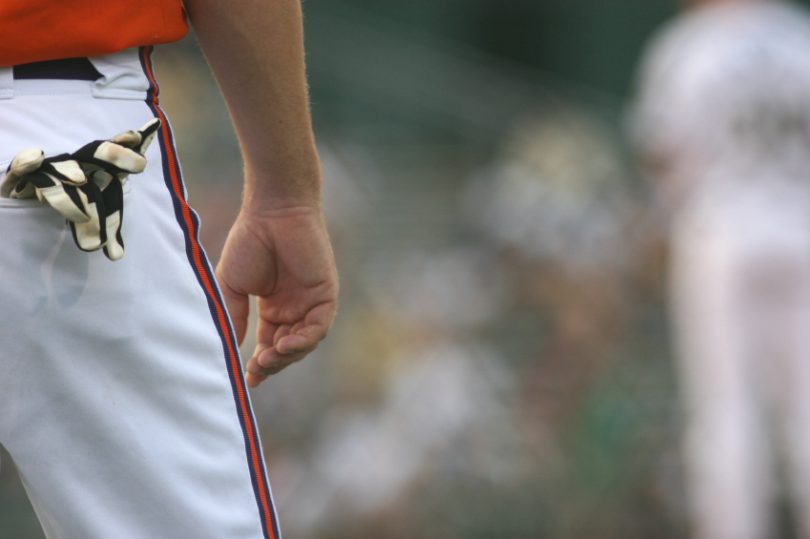By Ethan Guevin
Remember this story from last week’s blog?
Alex is a good high school baseball player. He found the KPB website early in high school and learned about what he needs to do to play college baseball. He studies hard and his grades are good. He makes a video and sends it out to schools. He receives several letters of interest from coaches who saw the video. He also goes to a local showcase at the end of his junior year where a lot of college coaches are present. He performs well at the showcase and hears from several more interested colleges. It is now the summer after his junior year and his summer team is going to a big national tournament. On his way to the tournament, he stops for a few unofficial visits and is shown around college campuses by the coaches.
John is a college recruiting coordinator. He spends his summers recruiting and he attends many showcases and tournaments. Early in the summer, he goes to a showcase where he sees Alex and a number of other prospects. He gets in touch with Alex and 6 other players and he arranges for them to visit his school on their way to the national tournament. John is also going to the national tournament to see 25 potential recruits at the same event. The event is hectic and takes place at several different high schools and baseball complexes. He tries to see as many of the players on his list as possible, and because of scheduling conflicts and priority players, he is only able to watch 5 innings of Alex’s game before having to leave to see a pitcher who is scheduled to throw. He gets to Alex’s game a little early and has time to watch him warm-up and interact with his teammates.
Without even knowing it, Alex is on John’s shortlist of potential players for his team. Alex isn’t aware, but he and 4 other infielders are being considered for one scholarship. Alex’s chances for the scholarship depend on what he does during the 5 innings that John sees him play. During these 5 innings, Alex can help, hurt, or ruin his chances of earning the scholarship to play college baseball.
So what does Alex do?
When Coach John gets to the field, he locates Alex and watches him warm-up. Alex’s jersey is untucked and he’s being lazy and a little sloppy with his warm up. He’s laughing and missing the occasional throw because he’s distracted. Even though Alex feels like he is preparing like he normally does, his sloppy appearance and lack of focus makes it seem like he isn’t taking the game seriously. At one point during the warm-up, Alex’s hat, which was slightly askew, falls off his head and to the ground while he is playing catch. He kicks it away and laughs.
When the game starts, Alex plays well. But, so does one of the other infielders (Rick) that Coach John saw. With players being committed to schools left and right, Coach John thinks that he’s under pressure to decide which player should get the scholarship offer. Alex and Rick both show above average defensive ability and signs that they will be able to hit at the next level. They both have 60-yd dash times of around 6.8. With all else equal on the baseball field, Coach John starts to think about other things. He remembers how Alex looked lazy and unfocused during warm-ups and that he didn’t seem to care about his uniform. Rick came to the field looking like he was proud of his uniform and was focused and calm during warm-ups. John starts to wonder. Does Alex really care? Will he prepare for games seriously enough so that he will be ready to play his best? Coach John needs to make a decision. He decides to offer the scholarship to Rick based on “preparation” concerns he has about Alex.
Lessons Learned:
• Your appearance matters. A clean, complete uniform will never hurt your chances of getting recruited, but a messy or sloppy appearance can. Looking sloppy gives coaches the perception that you might not take things seriously or you don’t care. Yes, this is unfair, but when recruiters are faced with difficult high pressure decisions, anything that sets a player apart matters.
• Show that you are prepared and focused before, during and after the game. You don’t have to be intense during warm ups. But, if you are distracted and lazy before your games, recruiters will question if you are serious enough to play for their teams or if you will care enough about things that matter more, like working hard to improve and good grades.
• Because recruiters don’t have time to get to know you, they have to make decisions based on what they see. Make sure your shirt is tucked in all the way, your uniform fits, your hat is worn straight, and your actions tell coaches that you are focused fully on your preparation and the game. When it comes to your appearance, think Derek Jeter and not Manny Ramirez.
Want to hear more about what college coaches are looking for and how they evaluate recruits?
Just click on the links below and learn from Alex’s mistakes!
Even Little Things Matter To Recruiters
Recruiters Want Players Who Can Handle Failure
Recruiters Want Players With Tools: Always Run a Hard 90
Recruiters Want Players Who Stay Focused
Your Transcript Tells Coaches More Than You Think
Emotional Versus Rational Decision-Making in the Recruiting Process







